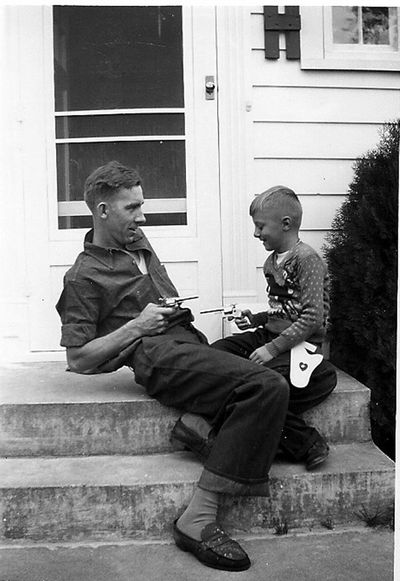Lessons from recessions

The way adults handle economic downturns helps determine the lifelong work attitudes of their children. A dozen Spokesman-Review readers shared what they learned from their parents during tough economic times. Here are three of those stories.
Joe Kramarz, Spokane: In 1958, in Grand Rapids, Mich., I was a teenager. My stepdad worked for Standard Oil as a truck mechanic.
One day, he got the announcement that they were consolidating operations in Detroit. The men “in the yard” began working for a company that took over. The new company cut wages and benefits nearly in half.
I observed many ripples from that event. No more vacations to Yellowstone. No more trips to the car races or to Lake Michigan.
My stepdad used to tell me that I was too stupid to work with my hands, and the only place for kids like me was in college. It was his way of motivating me. I did complete college and went on to a good job in the medical sales field.
In some dark days managing a sales force in Detroit and Chicago, I would think often of what he would have done in my situation. He did not quit his job, though it was painful to work for a boss who treated the men so badly. He did not abandon his family. He stayed the course so each of us had an opportunity to succeed.
You do a dollar’s worth of work for a dollar’s worth of pay. You do it because it is your job and you have a family. My stepfather did it. He led the way.
Kevin Wilfley, Spokane: When I grew up, there were occasional recessions in the economy, and my father was at times out of a job.
On one occasion, we could not buy gas for the car or food for the table. I was in need of clothes and so was my sister. I was embarrassed to go to school wearing my brother-in-law’s worn-out shoes.
When my mother was crying one day, she confided that there was no food and no money. There were welfare programs and food stamps, but my parents could never bring themselves to ask for public assistance.
They didn’t know I had saved up all my lawn-mowing money, so when I brought it to my mother and asked her to use it to buy food she at first resisted. But I insisted, and we went to town to buy food.
My father took me in his arms and told me how proud he was of me that I would be willing to contribute to the family’s needs. He promised he would make it up to me someday and he did, over and over again.
David T. Webb, Spokane: My father was an elevator operator when the Great Depression struck. He lost his job and was out of work for most of the 1930s.
My mother got a job at a five-and-dime store. My father became an alcoholic. He got work in the 1940s and was largely sober after I was born in 1945.
I witnessed the emotional scars that this inflicted on my brothers and sister, who all had unhappy lives. I had the benefit of a rock solid parochial and state college education which gave me the foundation for a successful life. But every time I see unemployment numbers, I see generations of families.